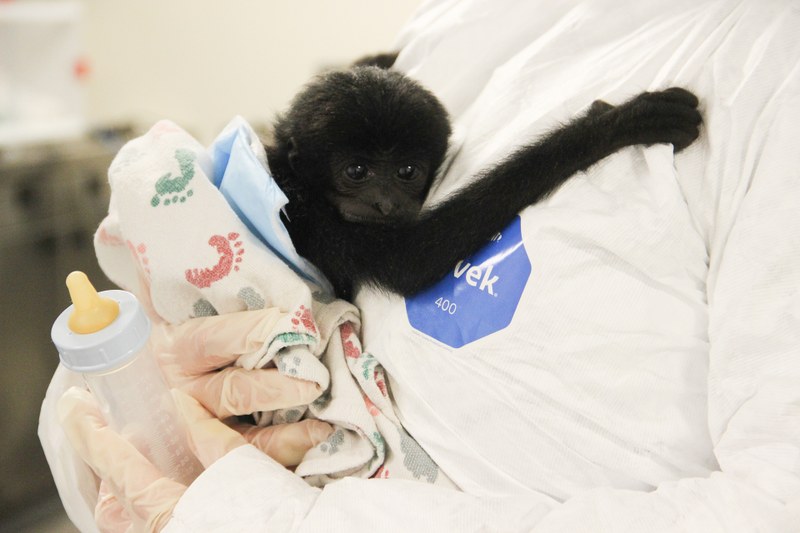
Siamang Rue Loses Fight Against Shigella
While the ABQ BioPark is encouraged by the recovery of most of its apes, staff mourn the loss of the siamang infant.
Sept. 14, 2021 - One month ago, the BioPark detected the Shigella bacteria in its ape population. Today, the BioPark is saddened to announce the loss of another animal to this highly infectious disease.
Rue, the infant siamang, passed away in the early hours Monday morning. His tiny body struggled against the Shigella infection even while under his mother’s care. As his mother Johore underwent treatments, caretakers supplemented Rue’s diet with formula in a bottle. When Johore succumbed to her infection, staff cared for Rue around the clock, utilizing every available resource to support his recovery.
The BioPark has previous experience hand-rearing infant siamangs and helped develop the protocol used by other facilities in the Association of Zoos and Aquariums (AZA). While caring for Rue, the BioPark also turned to the AZA network of relief veterinarians for additional support and brought in a neonatal expert from the Hand Rearing Resource Center. Vet techs from the City of Albuquerque’s Animal Welfare Department assisted with overnight infant siamang care to relieve weary BioPark staff. The BioPark also consulted with the local veterinary community for assistance and advice.
Despite these exceptional efforts, Rue failed to thrive. The BioPark’s attention is now focused on Rue’s 4-year-old brother, who recovered well from his Shigella infection.
Like other apes, siamangs are highly social animals that live in family groups, usually with several offspring. The BioPark is working with the AZA Species Survival Plan (SSP) to pair Eerie with another siamang group until he reaches adulthood. The BioPark will also work with the SSP to identify new residents for its upcoming Asia exhibit, which includes multi-species yards where orangutans can interact with gibbons like siamangs.
While Rue marks the ABQ BioPark's fourth loss from the Shigella infection, the BioPark is cautiously optimistic that the other apes are on the road to recovery. Most are feeling well and have resumed normal levels of activity.
All four orangutans can be seen outdoors daily. Pixel, the youngest orangutan, has been especially playful and delighting guests as he interacts with new enrichment. Almost all of the gorillas venture outdoors each day to play, socialize and eat. The BioPark's new silverback Kojo is frequently seen protecting his companions Nia and Samantha with vigorous displays. On a recent afternoon, the chimpanzee troop scampered throughout their yard collecting coveted fruit juice popsicles.
Male gorillas Hasani and Jack are on a slower road to recovery but showing increased levels of activity and appetite every day. The animal care staff is encouraged by Hasani’s enthusiastic participation in training sessions and the return of Jack’s healthy appetite. Female chimpanzee Rainey recently tested positive for Shigella and is showing signs of improvement. Social interaction is critical to a chimpanzee’s wellness, and staff closely monitor her behavior and diet when she joins the troop on exhibit each day. Desi has also returned to regular activity with the troop.
Throughout this tragic month, the incredible devotion of the BioPark’s team of animal care professionals has been inspiring. They have risen to the challenge of providing exceptional care for animals around the clock while grieving for the loss of four animals. The BioPark will continue to provide supportive care as needed until all apes are fully recovered, which may take many weeks or months.
This has been a challenging time for our great apes and the animal care professionals who nurture them. Our community has been very supportive during this difficult time, and we are very grateful for your continued support.
